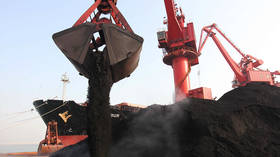Published time: 21 Feb, 2019 14:52

One of China’s biggest ports has put restrictions on shipments of coal from Australia, its top supplier of anthracite, casting a shadow upon Australia’s second largest export earner.
The Port of Dalian is set to cap overall coal imports from all sources at 12 million tons until the end of 2019, according to an official at Dalian Port Group, operator of the sea transportation hub, as quoted by Reuters.
The indefinite ban on Australian coal imports came into effect starting February with the biggest ports across China reportedly extending clearing times for coal shipments from the country to at least 40 days.
ALSO ON RT.COM‘All Chinese money into Silicon Valley stops’ after Huawei ban, former Beijing banker warns
Dalian customs currently oversees five harbors, including Dalian, Bayuquan, Panjin, Dandong and Beiliang. The body reportedly won’t allow Australian coal to clear through customs, while imports of coal from Russia and Indonesia are not going to be affected, according to the official.
Chinese customs are checking and testing coal imports for safety and quality, according to Geng Shuang, a spokesman at China’s foreign ministry.
The Australian dollar slid as much as 1.1 percent against its US counterpart on the news.
“The goals are to better safeguard the legal rights and interests of Chinese importers and to protect the environment,” he told journalists, when asked if the ban was tied to tensions between Beijing and Canberra.
ALSO ON RT.COMChina-US trade spat may leave American kids without toys
Diplomatic relations between the countries have been deteriorating since 2017, when Australian authorities accused China of interfering with its domestic affairs. Strain in bilateral relations intensified after Canberra cancelled the visa of a Chinese businessman Huang Xiangmo, earlier this month, for allegedly promoting Chinese interests in Australia.
Last month, Australia barred Chinese telecoms giants Huawei Technologies from providing 5G technology for their networks, citing national security concerns.
Australia is the world’s number one exporter of coal, while China remains its biggest trade partner, accounting for nearly 30 percent of Australian sales abroad. Apart from coal, main exports to China include iron ore and gold.
Australian Trade Minister Simon Birmingham said the government was aware of the problem, stressing that the country's ambassador in Beijing was asked to urgently clarify the situation.
“We continue to engage closely with industry on matters of market access… China is a valued partner of Australia and we trust that our free trade agreement commitments to each other will continue to be honored,” he said, as quoted by the agency.
Australian coal manufacturers are increasingly concerned over the current situation and the uncertainty of when the restrictions would be removed, according to Tania Constable, chief executive of the Minerals Council of Australia.
“We believe an unofficial quota system has been employed since the restructure of customs and quarantine administrative arrangements in October 2018. It would have a significant impact on the industry if restrictions extend for too long,”she told MSN.

0 Comments:
Post a Comment
Subscribe to Post Comments [Atom]
<< Home